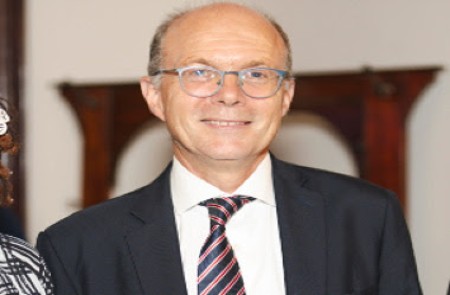German Embassy in Trinidad Launches German-Caribbean Climate Talks
PORT OF SPAIN, Trinidad – Germany has launched the “German-Caribbean Climate Talks” here amid concerns that temperatures in the Caribbean continue to reach record breaking highs, and the impacts of climate change are becoming an increasingly prominent concern for regional governments.
 German Ambassador to Trinidad and Tobago, Dr. Christophe EickThe German Embassy here said that the “German – Caribbean Climate Talks” on Monday focused on a Just Transition in the Caribbean, and the event was facilitated by Climate Analytics Caribbean.
German Ambassador to Trinidad and Tobago, Dr. Christophe EickThe German Embassy here said that the “German – Caribbean Climate Talks” on Monday focused on a Just Transition in the Caribbean, and the event was facilitated by Climate Analytics Caribbean.
The Trinidad-based Climate Analytics Caribbean and aims to significantly augment the scientifically informed, knowledge-based resources which Small Island Developing States (SIDS) and Least Developed Countries (LDCs) in the region require to effectively counter the effects of climate change.
Trinidad and Tobago’s lead climate change negotiator, Kishan Kumarsingh, who represented Planning and Development Minister, Pennelope Beckles, said the government has developed a Just Transition policy to allow a smooth and inclusive shift to low-carbon development whilst diversifying and generating opportunities for the workforce.
The policy has been submitted to Cabinet for approval.
“Trinidad and Tobago faces the dual challenge of transitioning towards low-carbon development, including through an energy transition, while safeguarding the livelihoods of those reliant on traditional industries, particularly in a nation where the energy sector has long been a cornerstone of the economy,” said Kumarsingh.
German Ambassador, Dr. Christophe Eick, who is also the Special Envoy for Climate Issues in the Caribbean, noted that the Caribbean is bearing the brunt of climate change.
“Germany is convinced that transition to a greener economy is both necessary and irreversible,” he said.
“This is why we are investing in this transition not only at home but also in many regions in the world including in the Caribbean. One of the priority areas of our regional technical cooperation in the Caribbean, carried out by GIZ experts, is to assist smaller island economies in transforming their energy and transport sectors,” he added.
Director, Subregional Headquarters for the Caribbean, UN Economic Commission for Latin America and the Caribbean (ECLAC), Diane Quarless, and Rueanna Haynes, Director of Climate Analytics Caribbean, also addressed the conference with Haynes noting that there was no obligatory or one size fits all approach to Just Transition.
“In international climate change negotiations, Just Transition has experienced a major evolution. We’re not dealing with an international discussion that seeks to dictate the pathways that countries take in order to have this just and equitable transition.
“It acknowledges that each country will take a different approach in line with its sustainable development priorities. We also note that these pathways should include social protection so as to mitigate potential negative impacts associated with the transition. These are very important principles that have been agreed in the context of the Just Transition discussion at the international level,” Haynes added.


